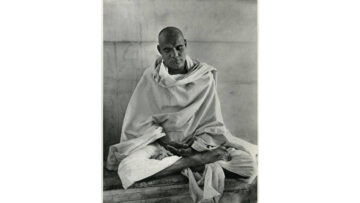How did an ordinary tribal person become to be known as ‘Bhagwan in just 25 years of his life? Furthermore, what were the circumstances that led to the establishment of Jharkhand State on the very same day of his birth?
It all starts with a baby born on November 15, 1875 in a Munda tribe in the current state of Jharkhand. During his childhood, Birsa spent his days in Chalkad (engaging in typical activities for a Munda child. He played with friends, rolled in sand and dust, and grazed sheep in the forest. His interest in playing the flute grew, and he became skilled in its melodies, often carrying it with him along with the tuila (a one-stringed instrument made from a pumpkin).
However, amidst the family’s poverty, Birsa was taken to Ayubhatu, his maternal uncle’s village and lived for several years before reuniting with his father and younger brother in Chalkad. Birsa resided in Ayubhatu for two years, attending school at Salga under the guidance of Jaipal Nag. It was during this time that Birsa encountered a Christian missionary visiting converted families in the village. Birsa soon realized the missionaries’ intention to convert tribals and felt compelled to challenge their activities. Impressed by Birsa’s aptitude, Jaipal Nag recommended him to attend the German Missionary School. Birsa converted to Christianity and took the name, Birsa David, later changed to Birsa Daud. He spent several years studying at the school before eventually deciding to leave.
Birsa’s stay in Chaibasa from 1886 to 1890 was influential in shaping his life. During this time, there was Christian agitation by the German and Roman Catholic Christians. In the midst of the freedom struggle, Birsa’s father, Sugana Munda, decided to withdraw him from school. In 1890, after leaving Chaibasa, Birsa and his family renounced their membership in the German mission, abandoned Christianity, and returned to their original tribal religious practices.
(Figure 1)
During the time period of 1890 to 1895, Birsa Munda had a profound realization that their land was suffering under the oppressive rule of the British. He witnessed the pervasive fear instilled in every individual, preventing them from challenging the unjust authority. It was during this period that the British, in their quest for agricultural expansion, issued an order to indiscriminately cut down a majority of the trees in Jharkhand. This sparked small-scale riots, but the absence of a strong leader hindered any significant resistance.
However, Birsa, wise beyond his years, understood the potential ramifications of remaining silent. Recognizing the future pain that awaited him, he fearlessly emerged as the leader of the entire tribal force, even at the young age of 20. With a clear vision for the betterment of society, he inspired and united various tribes, igniting a fire of resistance against the British and their Forest Act. Birsa’s charismatic leadership enabled the formation of numerous small groups, with a shared mission to confront British oppression head-on.
Armed only with rudimentary weapons such as stones, bows, and arrows, Birsa and his dedicated team managed to disrupt and suffocate the British forces, who possessed far superior firearms. Their strategic attacks on police stations and British checkposts sent shockwaves through the oppressive regime. Birsa’s unwavering determination and the courage of his followers delivered a heavy blow to the British, forcing them to retreat and abandon their initial plans.
However, this triumph was short-lived. Realizing the need to regain control and instil fear among the tribes, the British returned to the forest area, this time armed with heavy artillery and advanced weapons. Determined to capture Birsa and quell the rebellion, they resorted to desperate measures. A reward of 500 rupees was offered for information on Birsa’s whereabouts, leading to an act of betrayal within his own ranks. One of his trusted comrades betrayed him, providing the British with vital information. Birsa was subsequently apprehended and imprisoned, where he met a tragic fate, slowly poisoned by his captors.
(Figure 2)
Despite Birsa’s untimely demise, his unwavering spirit and sacrifice left an indelible mark on the history of resistance against British colonialism. His valiant efforts served as a rallying cry for future generations, inspiring a continued fight for freedom and justice
That is how Bhagwan Birsa Munda’s life serves as a powerful inspiration to stand up against injustice. It reminds us that longevity is not obligatory; rather, it is the impact we leave behind that truly matters. Birsa’s legacy teaches us to strive for a life where we become role models, inspiring others to fight for what is right.
Feature Image Credit: Chattrashakti.in
Disclaimer: The opinions expressed in this article belong to the author. Indic Today is neither responsible nor liable for the accuracy, completeness, suitability, or validity of any information in the article.










